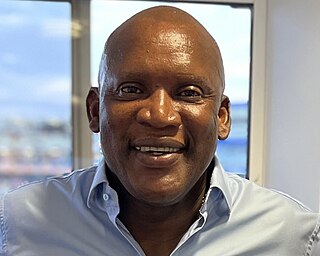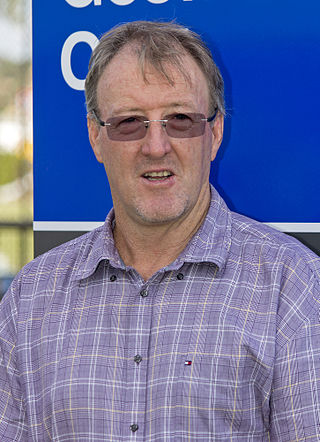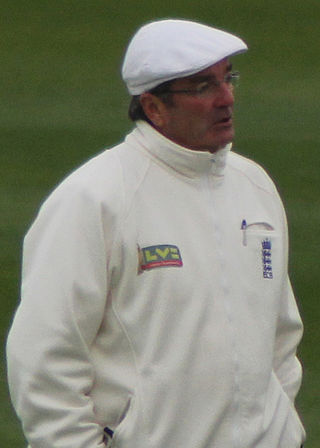
Michael Andrew Atherton is a broadcaster, journalist and a former England international cricketer. A right-handed opening batsman for Lancashire and England, and occasional leg-break bowler, he achieved the captaincy of England at the age of 25 and led the side in a then record 54 Test matches. Known for his stubborn resistance during an era of hostile fast bowling, Atherton was described in 2001 as a determined defensive opener who made "batting look like trench warfare". He had several famed bouts with bowlers including South Africa's Allan Donald and Australia's Glenn McGrath. Atherton often played the anchor role at a time when England batting performances lacked consistency.

Graham Alan Gooch, is a former English first-class cricketer who captained Essex and England. He was one of the most successful international batsmen of his generation, and through a career spanning 1973 until 1997, he was the most prolific run scorer of all time, with 67,057 runs across first-a class and limited-overs games. His List A cricket tally of 22,211 runs is also a record. In 1992, he became the first cricketer to lose 3 finals of the Cricket World Cup and is currently the only such player. He is one of only 25 players to have scored over 100 first-class centuries. He was a part of the English squads which finished as runners-up at the 1979 Cricket World Cup, as runners-up at the 1987 Cricket World Cup and as runners-up at the 1992 Cricket World Cup.

Stuart Charles Glyndwr MacGill is an Australian former cricketer who played 44 Test matches and three One Day Internationals for the Australian national cricket team. He is a right-arm leg spin bowler, who has been credited with having the best strike rate of any modern leg-spin bowler, but he did not have a regular place in the Australian Test team due to the dominance of Shane Warne in the position of sole spinner.

Shaun Tait is a former Australian professional cricketer who was appointed as the bowling coach of the Pakistan national cricket team in February 2022. He played as a right arm fast bowler and represented Australia in all three forms of cricket, but had most success in One Day Internationals, in which he was a member of Australia's undefeated team at the 2007 Cricket World Cup, and Twenty20 cricket. Tait won four different awards throughout his career including the Bradman Young Cricketer of the Year in 2004. He is considered one of the fastest bowlers of all time.

Devon Eugene Malcolm is a Jamaican-born English former cricketer. Born in Kingston, Jamaica, Malcolm played in 40 Test matches and 10 One Day Internationals for the England cricket team.

Derek Raymond Pringle is a Kenyan-born English former Test and One Day International cricketer for England, and is now a cricket journalist. He was a part of the English squads which finished as runners-up at the 1987 Cricket World Cup and as runners-up at the 1992 Cricket World Cup.
Philip John Newport is a former English first-class cricketer, who played primarily as a seam and swing bowler. Newport was a stalwart of Worcestershire County Cricket Club for most of the 1980s and 1990s, and played a key part in the county's triumphs in the late 1980s. Newport played in three Test matches for England between 1988 and 1991. He was born at High Wycombe in 1962.

Fazal Mahmood PP, HI was a Pakistani international cricketer. He played in 34 Test matches and took 139 wickets at a bowling average of 24.70. The first Pakistani to pass 100 wickets, he reached the landmark in his 22nd match.
Graham Roy Dilley was an English international cricketer, whose main role was as a fast bowler. He played first-class cricket for Kent County Cricket Club and Worcestershire County Cricket Clubs, and appeared in 41 Test matches and 36 One Day International (ODIs) for the England cricket team.
Phillip Anthony Jason "Daffy" DeFreitas is an English former cricketer. He played county cricket for Leicestershire, Lancashire and Derbyshire, as well as appearing in 44 Test matches and 103 ODIs. Cricket writer Colin Bateman noted that "DeFreitas was an explosive hitter when the mood took him, an aggressive pace bowler, inclined to pitch everything short and a spectacular fielder". He was a part of the English squad which finished as runners-up at the 1987 Cricket World Cup and as runners-up at the 1992 Cricket World Cup.

Geoffrey Francis Lawson, is an Australian cricket coach and former cricketer and the former coach of the Pakistan cricket team.
The England cricket team toured Australia during the 1986–87 cricket season for a five-match Test series to contest The Ashes. While in Australia, England also played a number of tour matches against state and representative teams, and competed in two One-Day International (ODI) tournaments. Under the captaincy of Mike Gatting, England retained the Ashes with a 2–1 series win.
Gladstone Cleophas Small is an English former cricketer, who played in 17 Test matches and 53 One Day Internationals (ODIs) for the England cricket team. He was a part of the English squads which finished as runners-up at the 1987 Cricket World Cup and as runners-up at the 1992 Cricket World Cup.
Geoffrey Miller, is an English former cricketer, who played in 34 Test matches and 25 One Day Internationals for the England cricket team between 1976 and 1984. Nicknamed "Dusty", he played for Derbyshire from 1973 to 1986, captaining the side from 1979 to 1981, and returned in 1990 after playing for Essex between 1987 and 1989. He was an England selector from 2008 to 2013 and was appointed President of Derbyshire C.C.C. in March 2014. He was a part of the English squad which finished as runners-up at the 1979 Cricket World Cup.
Edward Ernest Hemmings is a former English cricketer, who played in 16 Test matches and 33 One Day Internationals for the England cricket team between 1982 and 1991. He made his England debut relatively late in his career, at the age of 33, having predominantly represented Nottinghamshire in the County Championship. His chance came when several England players announced their intention to go on a rebel cricket tour to South Africa. He was a part of the English squad which finished as runners-up at the 1987 Cricket World Cup.

Nicholas Grant Billson Cook is an English cricket umpire and former player who appeared in 15 Tests and three ODIs between 1983 and 1989. A slow left-arm orthodox spin bowler and a lower order right-handed batsman, he played first-class and List A cricket from 1978 to 1994. He is currently an ECB appointed umpire on the professional circuit. He was born in Leicester and attended Lutterworth Grammar School.

Timothy Grant Southee, is a New Zealand international cricketer who captains for New Zealand cricket team in all formats of the game. He is a right-arm medium-fast bowler and a hard-hitting lower order batsman. The third New Zealand bowler to take 300 Test wickets, he was one of the country's youngest cricketers, debuting at the age of 19 in February 2008. On his Test debut against England he took 5 wickets and made 77 off 40 balls in the second innings. He plays for Northern Districts in the Plunket Shield, Ford Trophy and Super Smash as well as Northland in the Hawke Cup. He was named as New Zealand's captain for the first T20I against West Indies in place of Kane Williamson, who was rested for that game. The Blackcaps won that match by 47 runs. Southee was a member of the New Zealand team that won the 2019–2021 ICC World Test Championship. Southee currently has the highest (international) test batting strike rate among the batsmen with a minimum of 2000 test runs. His (batting) career strike rate is 83.12. He was also a part of the New Zealand squads to finish as runners-up in two Cricket World Cup finals in 2015 and 2019.
The West Indian cricket team played 16 first-class cricket matches in England in 1988, under the captaincy of Viv Richards. They enjoyed considerable success during the tour, while England endured a "disastrous summer" of continuous change.
The Bicentennial Test was a single Test cricket match played between Australia and England at the Sydney Cricket Ground in celebration of the bicentenary of permanent colonial settlement in Australia. The match took place from 29 January to 2 February 1988 and was drawn. It did not count as part of The Ashes series, in the same way as the Centenary Tests in 1977 and 1980 also were excluded from the Ashes lists.

Ryan James Harris is an Australian cricket coach and former cricketer. He was a right-arm fast bowler who was a member of the Australia national cricket team until retiring in the Ashes tour lead up of 2015 due to a knee injury. It had hampered him for a majority of his career, but despite this, he performed as one of Australia's most highly rated fast bowlers. His first ball bowling of Alastair Cook in the 2013 Ashes series has been rated as one of the greatest balls of all time.










